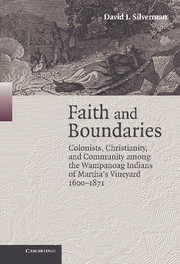 Faith and Boundaries
Faith and Boundaries Book contents
- Frontmatter
- Contents
- Maps, Tables, and Figures
- Abbreviations
- Preface: Do Good Walls Make Good Neighbors?
- Introduction: Epenow's Lessons
- 1 “Here Comes the Englishman”
- 2 To Become All Things to All Men
- 3 The Lord Tests the Righteous
- 4 Deposing the Sachem to Defend the Sachemship
- 5 Leading Values
- 6 The Costs of Debt
- 7 “Newcomers and Strangers”
- Conclusion: Fencing In, Fencing Out
- Appendix A The Population of Martha's Vineyard
- Appendix B A Cross-Comparison of Indian Race Descriptions
- Index
3 - The Lord Tests the Righteous
Published online by Cambridge University Press: 17 December 2010
- Frontmatter
- Contents
- Maps, Tables, and Figures
- Abbreviations
- Preface: Do Good Walls Make Good Neighbors?
- Introduction: Epenow's Lessons
- 1 “Here Comes the Englishman”
- 2 To Become All Things to All Men
- 3 The Lord Tests the Righteous
- 4 Deposing the Sachem to Defend the Sachemship
- 5 Leading Values
- 6 The Costs of Debt
- 7 “Newcomers and Strangers”
- Conclusion: Fencing In, Fencing Out
- Appendix A The Population of Martha's Vineyard
- Appendix B A Cross-Comparison of Indian Race Descriptions
- Index
Summary
An islander's life is ever attuned to the weather, and that was particularly true in colonial New England. Throughout any given day, salt-crusted fishermen and sun-bleached farmers scanned the horizon for signs of the next nor'easter, a torrent of wind and water that devoured boats and flattened crops during the warm months, and dumped ungodly amounts of snow in just a few hours in winter. One can be certain that Vineyarders were watching the sky during the last week of June 1675, and, if it was clear, Indians atop Menemsha's hills or Aquinnah's shoreline cliffs might have seen smoke billowing from the smoldering mainland towns of Swansea, Rehoboth, and Taunton. After nearly annual rumors of an Indian conspiracy and, more recently, heightened tensions between mainland Wampanoags and Plymouth, one question would have immediately flashed through their minds: “Had Philip's men finally struck against the English?” To find out, messengers would have raced to alert all the Vineyard sachems and the Mayhews in Edgartown, followed by a scramble for reliable news. While awaiting confirmation, Indians and Englishmen who commonly worked and traded together would begin to eye one another suspiciously. The future was very uncertain in the summer of 1675.
Still, there was reason to believe that this was just another in a string of false alarms, that the smoke rose from a mere house fire or forest blaze that had spread out of control.
- Type
- Chapter
- Information
- Faith and BoundariesColonists, Christianity, and Community among the Wampanoag Indians of Martha's Vineyard, 1600–1871, pp. 78 - 120Publisher: Cambridge University PressPrint publication year: 2005


